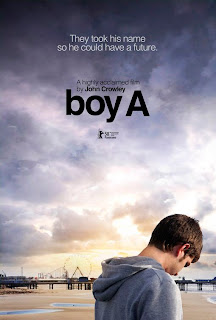Boy A
 Boy A, a British film directed by John Crowley, is a better-than-average drama that does a clever thing: it seduces us into becoming empathetic with a person who turns out to be someone that most of us despise, and then lets us wrestle with our feelings. I admired how the film did this, but it kept from being an excellent film by the conventionality of its structure.
Boy A, a British film directed by John Crowley, is a better-than-average drama that does a clever thing: it seduces us into becoming empathetic with a person who turns out to be someone that most of us despise, and then lets us wrestle with our feelings. I admired how the film did this, but it kept from being an excellent film by the conventionality of its structure.At the outset we meet Jack, who we understand is being released from prison. He has chosen the name Jack because he is changing identities. He has a case worker, played by Peter Mullan, who takes care of him. Jack has a place to live and a job, and very quickly makes friends and finds a girlfriend.
Through flashbacks, we see into Jack's past. He makes friends with a charismatic sociopath named Phillip, who is now dead. Eventually the magnitude of Jack's crime is revealed to the audience, and the question remains--will Jack's friends find out, and if so, what will happen?
The problem with Boy A is the answer to those questions are apparent to anyone paying attention, especially when a subplot involving Mullan's layabout son is set in motion. That's too bad, because the greater questions raised by the film--is a person who commits a monstrous act always a monster--are overshadowed by melodrama.
Andrew Garfield's performance as Jack is problematic. He's so likable and good-natured that our response is manipulated--of course we would forgive him, because we've seen the film from his eyes. Aside from a few images of tabloid newspapers, we don't know the viewpoint of those who take the opposite side.
The film would seem to modeled after the James Bulger murder case of 1993. I've just read that the killers of that little boy were released, and have never been the victim of vigilantism.


Comments
Post a Comment